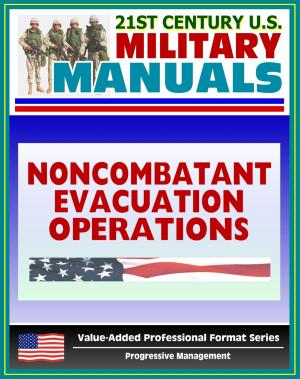History of the Joint Chiefs of Staff: The War in Vietnam 1971-1973 - Defoliation, Agent Orange, Herbicide Operations, Troop Withdrawals, LINEBACKER, Collapse of South Vietnam
Nonfiction, History, Asian, Southeast Asia, Military, Vietnam War| Author: | Progressive Management | ISBN: | 9781301069170 |
| Publisher: | Progressive Management | Publication: | October 5, 2013 |
| Imprint: | Smashwords Edition | Language: | English |
| Author: | Progressive Management |
| ISBN: | 9781301069170 |
| Publisher: | Progressive Management |
| Publication: | October 5, 2013 |
| Imprint: | Smashwords Edition |
| Language: | English |
The volume describes the formulation of policies and decisions that completed the US withdrawal from Vietnam and shifted the burden of combat to the Republic of Vietnam Armed Forces. Using the sources to which he had access, Mr. Willard J. Webb completed a manuscript soon after the war ended. Since that time, a critical source has become available. Admiral Thomas H. Moorer, Chairman of the Joint Chiefs of Staff during 1970-1974, kept a daily diary describing his conversations, meetings that he attended, and from April 1972 onward, verbatim transcripts of many of his telephone conversations. With this new material, Dr. Walter S. Poole substantially revised the chapters that covered the Laotian incursion of 1971, the Easter offensive of 1972, the Christmas bombings of Hanoi and Haiphong, and the Paris peace accords of January 1973 followed by their rapid unraveling. He also made small changes to other chapters.
It has been argued that a new US strategy, initiated during 1968-1969, reached a successful culmination in 1972 by showing that the South Vietnamese could stand on their own. The weight of evidence in JCS records—particularly the material in Admiral Moorer's diary—does not support that argument. For President Richard Nixon, Dr. Henry Kissinger, and Admiral Moorer, the outcome of the 1971 Laotian incursion raised grave doubts about whether American efforts to "Vietnamize" the war would succeed. In May 1972, the collapse at Quang Tri convinced them that the Republic of Vietnam Armed Forces could not cope with the North Vietnamese attack and that American air power had become indispensable to the Saigon government's survival. Thereafter, the administration's actions can be characterized as attempts to insure that there would be at least a "decent interval" between the signing of peace accords and the dissolution of South Vietnam.
-
LAM SON 719: The "Moment of Truth" * 2. Policy and Strategy, 1971-Early 1972 * 3. United States and Free World Troop Withdrawals in 1971 * 4. Determining US Air Support Levels for Southeast Asia in 1971 * 5. The Conduct of the War in South Vietnam, 1971-Early 1972 * 6. Air Operations in Southeast Asia, 1971-Early 1972 * 7. Expansion and Improvement of the RVNAF in 1971 * 8. The North Vietnamese Offensive * 9. Force Withdrawals 1972 * 10. RVNAF Improvement, 1972 * 11. Pacification and Political Development, 1971-1972 * 12. The Negotiations to End the War in 1971 and 1972 * 13. Peace in the Balance, October-December 1972 * 14. The Agreement * 15. Winding Down the War * 16. Finale * 17. The Role of the Joint Chiefs of Staff: An Overview
-
LAM SON 719: The "Moment of Truth" * Inception * Advance Becomes Consolidation * "Bugging Out?" * Public and Private Assessments * 2. Policy and Strategy, 1971-Early 1972 * A Vietnam Review, April-July 1971 * A Review of the Cambodian Situation * The Management of Military Assistance in Cambodia * A Review of US Activities in Laos * Reassessments in Early 1972 * 3. United States and Free World Troop Withdrawals in 1971 * United States Redeployments, January-April 1971 * Planning for the Next Presidential Announcement * Contingency Planning for a Cease-Fire * COMUSMACV Plan 208 * Further JCS Recommendations * The President's Decision * US Redeployments, May-November 1971 * Planning the Next Redeployment * The November Announcement * US Redeployments, December 1971-January 1972 * Reduction of Free World Military Assistance Forces * ROK Withdrawals * Redeployment of Thai Forces * Australian and New Zealand Redeployments * 4. Determining US Air Support Levels for Southeast Asia in 1971 * Air Support for FY 1972 * A Tentative Decision * A Final Decision * 5. The Conduct of the War in South Vietnam, 1971-Early 1972 * The Enemy * The Allies * A Revised Mission for US Ground Forces * Ground Operations * Naval Operations * Appraisals of the ARVN: Washington Versus Saigon * 6. Air Operations in Southeast Asia, 1971-Early 1972
The volume describes the formulation of policies and decisions that completed the US withdrawal from Vietnam and shifted the burden of combat to the Republic of Vietnam Armed Forces. Using the sources to which he had access, Mr. Willard J. Webb completed a manuscript soon after the war ended. Since that time, a critical source has become available. Admiral Thomas H. Moorer, Chairman of the Joint Chiefs of Staff during 1970-1974, kept a daily diary describing his conversations, meetings that he attended, and from April 1972 onward, verbatim transcripts of many of his telephone conversations. With this new material, Dr. Walter S. Poole substantially revised the chapters that covered the Laotian incursion of 1971, the Easter offensive of 1972, the Christmas bombings of Hanoi and Haiphong, and the Paris peace accords of January 1973 followed by their rapid unraveling. He also made small changes to other chapters.
It has been argued that a new US strategy, initiated during 1968-1969, reached a successful culmination in 1972 by showing that the South Vietnamese could stand on their own. The weight of evidence in JCS records—particularly the material in Admiral Moorer's diary—does not support that argument. For President Richard Nixon, Dr. Henry Kissinger, and Admiral Moorer, the outcome of the 1971 Laotian incursion raised grave doubts about whether American efforts to "Vietnamize" the war would succeed. In May 1972, the collapse at Quang Tri convinced them that the Republic of Vietnam Armed Forces could not cope with the North Vietnamese attack and that American air power had become indispensable to the Saigon government's survival. Thereafter, the administration's actions can be characterized as attempts to insure that there would be at least a "decent interval" between the signing of peace accords and the dissolution of South Vietnam.
-
LAM SON 719: The "Moment of Truth" * 2. Policy and Strategy, 1971-Early 1972 * 3. United States and Free World Troop Withdrawals in 1971 * 4. Determining US Air Support Levels for Southeast Asia in 1971 * 5. The Conduct of the War in South Vietnam, 1971-Early 1972 * 6. Air Operations in Southeast Asia, 1971-Early 1972 * 7. Expansion and Improvement of the RVNAF in 1971 * 8. The North Vietnamese Offensive * 9. Force Withdrawals 1972 * 10. RVNAF Improvement, 1972 * 11. Pacification and Political Development, 1971-1972 * 12. The Negotiations to End the War in 1971 and 1972 * 13. Peace in the Balance, October-December 1972 * 14. The Agreement * 15. Winding Down the War * 16. Finale * 17. The Role of the Joint Chiefs of Staff: An Overview
-
LAM SON 719: The "Moment of Truth" * Inception * Advance Becomes Consolidation * "Bugging Out?" * Public and Private Assessments * 2. Policy and Strategy, 1971-Early 1972 * A Vietnam Review, April-July 1971 * A Review of the Cambodian Situation * The Management of Military Assistance in Cambodia * A Review of US Activities in Laos * Reassessments in Early 1972 * 3. United States and Free World Troop Withdrawals in 1971 * United States Redeployments, January-April 1971 * Planning for the Next Presidential Announcement * Contingency Planning for a Cease-Fire * COMUSMACV Plan 208 * Further JCS Recommendations * The President's Decision * US Redeployments, May-November 1971 * Planning the Next Redeployment * The November Announcement * US Redeployments, December 1971-January 1972 * Reduction of Free World Military Assistance Forces * ROK Withdrawals * Redeployment of Thai Forces * Australian and New Zealand Redeployments * 4. Determining US Air Support Levels for Southeast Asia in 1971 * Air Support for FY 1972 * A Tentative Decision * A Final Decision * 5. The Conduct of the War in South Vietnam, 1971-Early 1972 * The Enemy * The Allies * A Revised Mission for US Ground Forces * Ground Operations * Naval Operations * Appraisals of the ARVN: Washington Versus Saigon * 6. Air Operations in Southeast Asia, 1971-Early 1972















